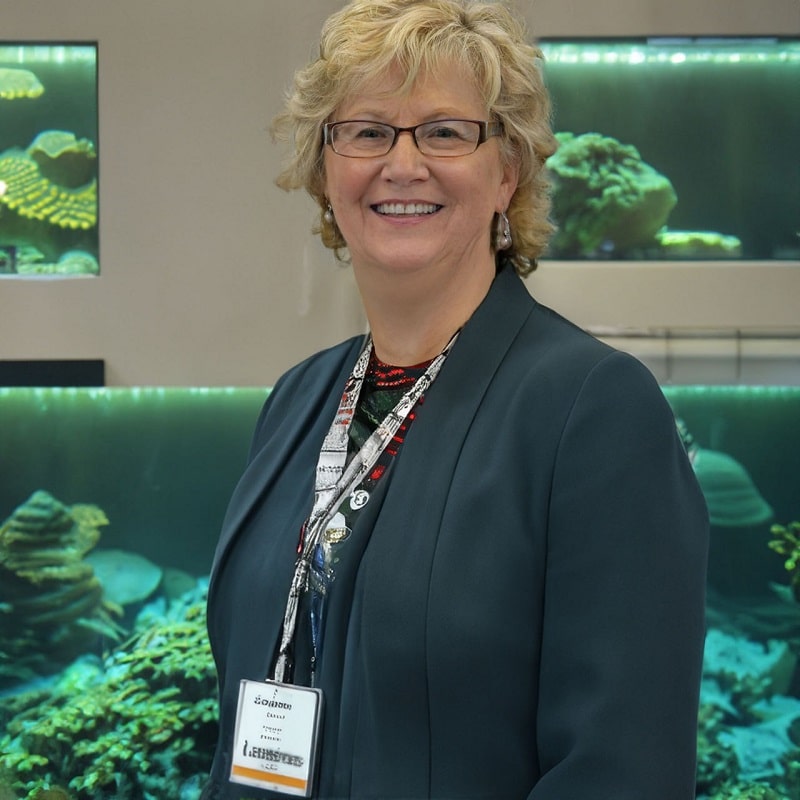Have you ever found yourself pondering, “Do guppies sleep?” For those with guppies as their underwater pals, you may have observed some intriguing behaviors that make you question whether or not they experience sleep. Whether you are a devoted guppy owner or simply intrigued by these aquatic creatures, you’ve landed on the right page.
In this blog post, National Park Aquarium will demystify the enigma of guppy sleep patterns, explore why slumber is crucial for these tiny finned friends, and provide you with insights on how to spot a snoozing guppy. So, let’s dive deep into the aquatic realm and uncover the secrets of guppy shut-eye, unfolding the happenings beneath the gentle waves of your aquarium.
Do Guppies Sleep?
Just like many other fish, guppies need their rest too. Getting enough sleep helps them stay healthy and avoid sickness. If they don’t get enough sleep, they can become stressed, get sick more easily, and not grow properly.
It can be tricky to tell if a guppy is asleep or awake just by looking at them. But if you learn a bit about guppies and how they usually act, you can get a better idea of when they’re resting and make sure they’re getting the sleep they need.
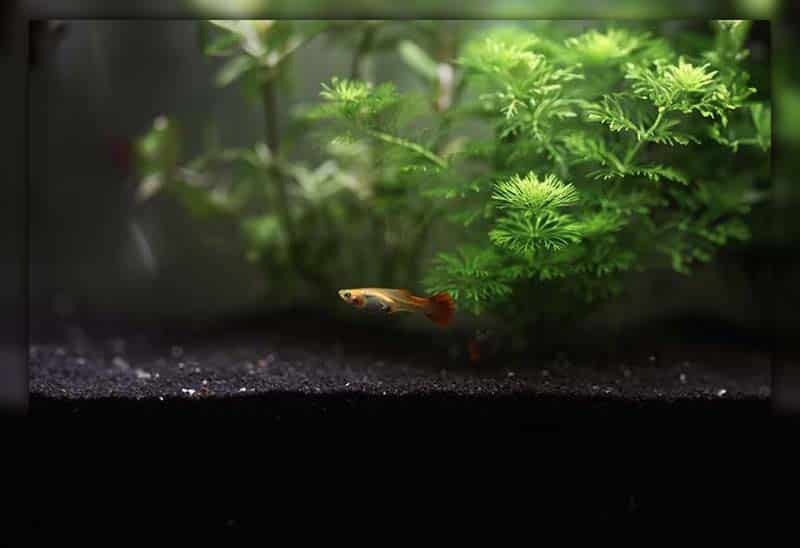
How Do Guppies Sleep in a Tank?
Guppies, and many other fish, have a different way of resting than mammals like us. They don’t have eyelids, so they can’t shut their eyes. But, they do have moments where they’re less active and more relaxed, and this is kind of like their version of “sleep.” Here’s how to spot when a guppy is taking its rest or “sleeping” break:
Floating At The Top Of The Tank
When guppies are resting, they don’t swim around actively. They might just float, going wherever the water takes them. Sometimes, they’ll float near the top of the tank. It’s usually not a problem if they’re active during their awake times. But keep an eye on them if they’re always near the top; there might be other reasons for that behavior.
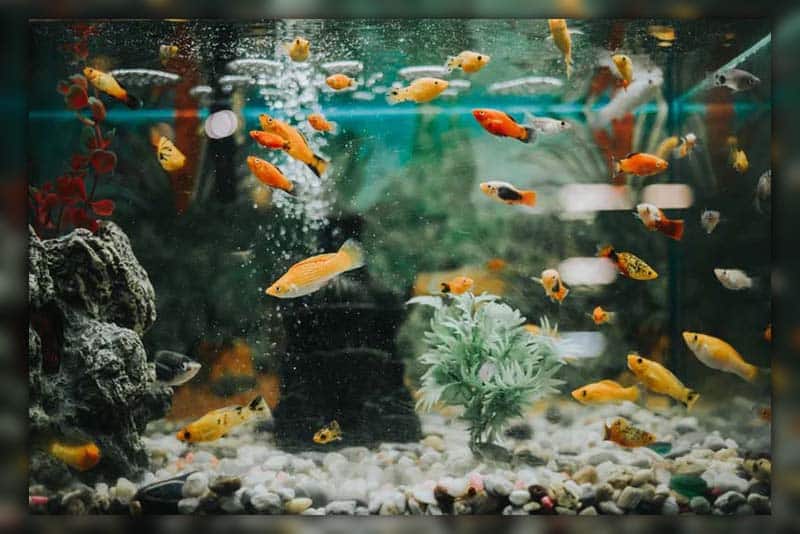
Sinking At The Bottom
A common question from guppy owners is whether guppies sleep at the bottom. The answer is yes! Guppies often rest either at the surface or down by the gravel. Being near the bottom offers them a sense of safety and allows them to be close to plants or decorations. If you see them staying still in one spot at night, they’re likely just sleeping.
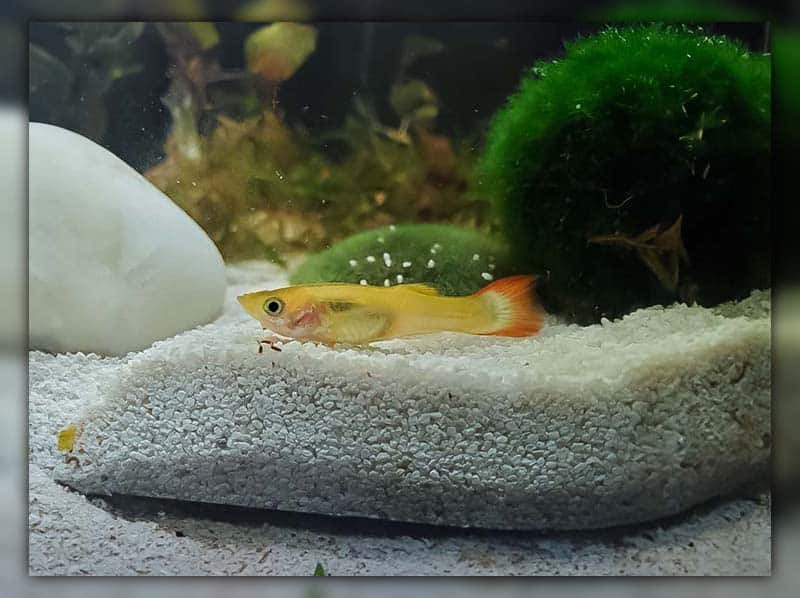
Lack Of Eye Movement
One of the easiest ways to tell if a guppy is awake or asleep is by watching their eyes. A resting guppy won’t move its eyes much. While their eyes are small, you can usually spot movement because when they’re awake, they’re always looking around.
Twitching
Sometimes, you’ll see a guppy’s tail or fins twitch while they’re resting. This isn’t them being active – it’s just a natural way they maintain their balance in the water. The twitches can be random, so you might only notice them if you’re watching closely.
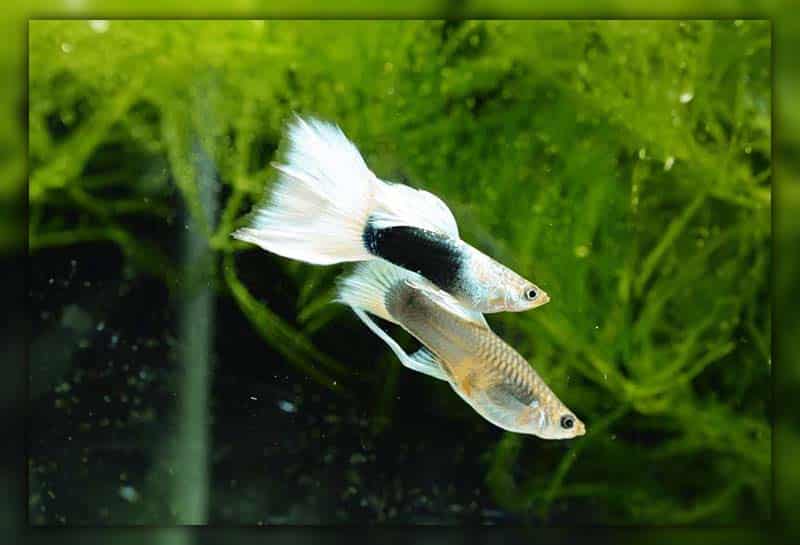
Anchored To Hiding Spots
Guppies might choose to rest near items in the tank, like ornaments or plants. These spots offer them a place to stay put and feel hidden from potential threats.
Low Respiratory Rate
Guppies are active breathers when they’re awake, taking in oxygen through their gills. But when they’re resting, their breathing slows way down.
Insensitivity To Sound
A sleeping guppy won’t be easily disturbed by sounds. They’ll mostly stay in their resting state until they sense light or movement in the tank.
Why Is Sleep Important For Guppies?
Sleep, or rest, plays a critical role for guppies, much like it does for humans and other animals. It gives them a chance to recharge and helps keep them healthy. If guppies don’t get enough rest, they might face health issues like stress, sickness, and a shorter lifespan.
Here’s why rest is so vital for guppies:
- Body Recovery: Rest gives guppies a chance to heal. It’s a time when the body can fix any cell or tissue damage that might have happened during the day. This is super important for guppies that might be breeding or living in less-than-ideal conditions.
- Brain Health: Rest is crucial for a guppy’s brain. It helps them remember things and think clearly. Without enough rest, guppies might struggle to learn new things or be less alert to what’s going on around them.
- Boosting Health: A good rest helps guppies fend off diseases. If they’re always tired and not resting enough, they might get sick more often or take longer to get better when they do fall ill.
- Stress Relief: Being well-rested makes guppies less stressed. And less stress is always good. A stressed-out guppy might act out or be more likely to get sick.
Remember, just like with humans, ensuring your guppies get the rest they need can make a big difference in their overall well-being.
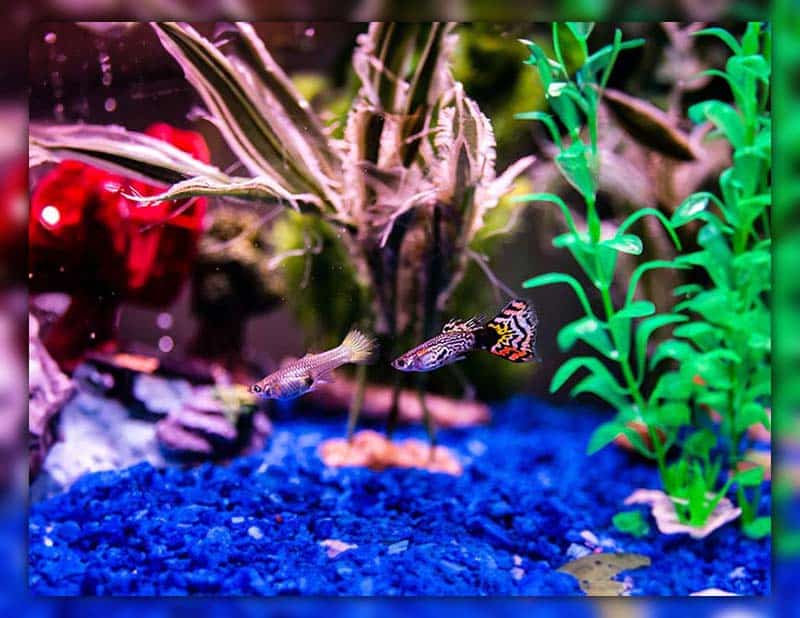
How Long Do Guppies Sleep?
Guppies usually rest for about 6 to 8 hours a day. But, just like us, how much sleep they need can change based on a few factors. Younger guppies might need more rest, as might those living in more challenging conditions.
For instance, baby guppies or those in stressful surroundings might need to sleep a bit longer. It’s essential to pay attention to their individual needs and make sure they’re getting the rest they require.
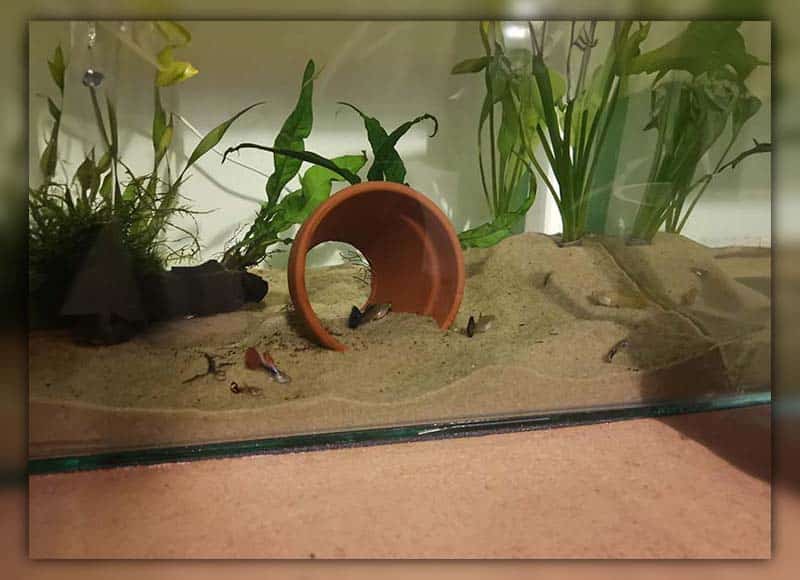
Exceptions To Keep A Look Out For
While many guppies show these typical behaviors, there are always exceptions. If you notice unusual behavior, it might be a sign of an underlying issue that needs prompt attention and action.
Floating In Daylight
It’s normal for guppies to float at the top or bottom of their tank during their resting times, but if you see this behavior during the day, you might have a reason to be concerned. Guppies are usually active and on the move during daylight hours. So, if they’re motionless, something might be off. If you also observe issues like white spots or irregular patches on their scales, seek advice from a fish expert or vet right away.
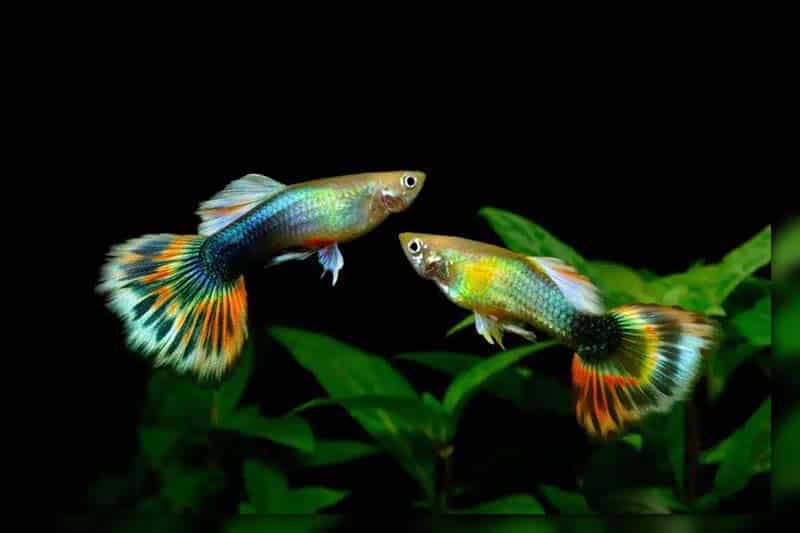
Pregnant Guppies
When a guppy is expecting, she might spend more time near the bottom, especially close to plants or hiding places, simply because she’s tired. Typically, she’ll rest there until she has her babies and then get back to her usual active self. Keep an eye on pregnant guppies at the bottom; a close watch can help you spot and address any issues early on.
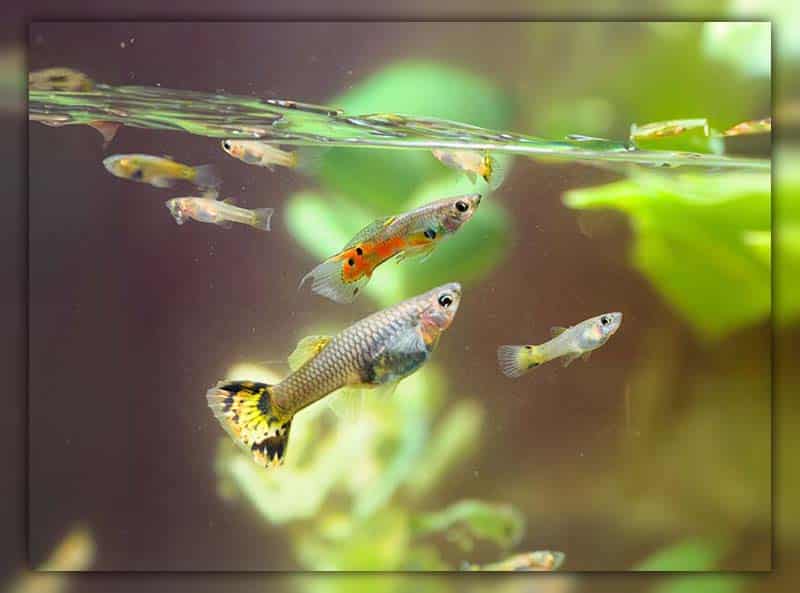
Stressed Guppies
Several things can stress out a guppy. Maybe they’re not getting along with their tank mates, there’s too much algae, the oxygen level isn’t right, or the water temperature isn’t ideal. If you notice a guppy that looks okay but stays at the bottom during the day, you should check its environment and health. It could be feeling stressed or might be unwell.

Do Guppies Sleep on the Bottom Of The Tank?
Guppies usually rest at the bottom of their tank at night. But if you notice them doing this during daytime hours, there might be something amiss.
When you spot guppies resting at the tank’s bottom during the day, it’s a good idea to check the water quality and ensure the tank isn’t too crowded. Also, keep an eye out for other signs that they might not be feeling well, such as seeming sluggish, not eating, or having trouble breathing. If you have any concerns about your guppies’ health, it’s always wise to reach out to a veterinarian for advice.
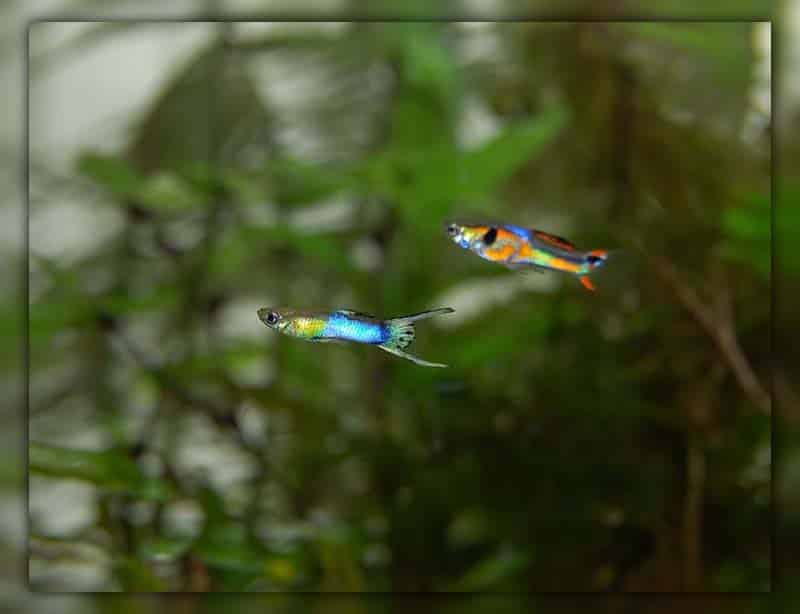
Do Guppies Sleep Upside Down?
Guppies don’t sleep upside down. They usually rest at the bottom of the tank, lying horizontally. If you ever see a guppy turned upside down, it’s likely a red flag indicating an issue like sickness, unsuitable water conditions, or stress.
Differentiating Between A Guppy Sleeping Or Dying
Losing a pet, even a small one like a guppy, can be tough. Even though our interactions with fish may be limited, it doesn’t lessen the bond formed with them. Sometimes, a guppy that’s resting can be mistaken for one that has passed away due to their stillness.
To tell the difference between a sleeping guppy and a deceased one, keep these pointers in mind:
- If your guppy is floating still during daytime hours, this could be a sign of illness or worse. Make sure to check on them right away.
- When a guppy’s fins and tail are motionless for a prolonged period, it may be a sign that the fish has passed.
- A non-moving set of gills or lungs typically indicates a dead guppy.
- Try dropping a little food into the tank. If there’s no reaction from the guppy, it might be dead.
- Turn on the tank lights if you’re uncertain. An unresponsive guppy to this change in light likely indicates it’s no longer alive.
- Lastly, you can gently use a net to approach the fish. Guppies will usually feel the vibrations of the net entering the water and react, either by a small twitch or by swimming away. If there’s no response, the guppy might be gone.
And if you’re curious about the typical lifespan of a guppy, they generally live for about 2-3 years.
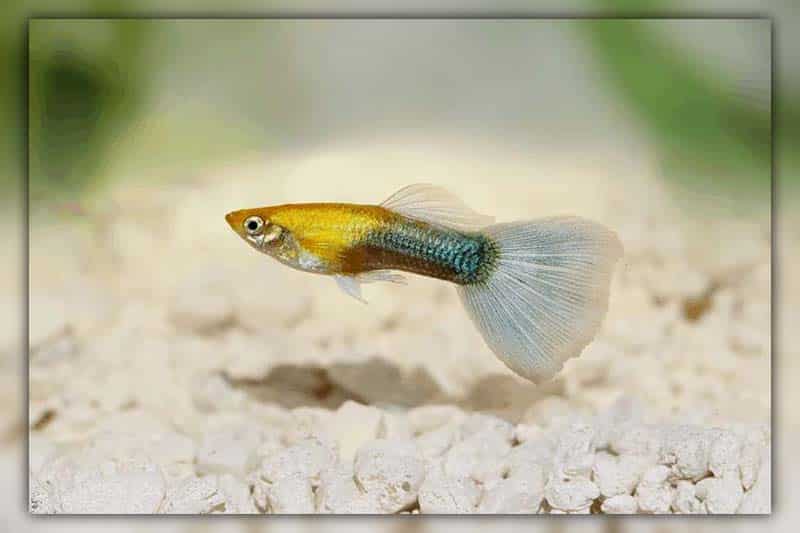
Conclusion
So, we’ve delved into the intriguing question: “Do guppies sleep?” Understanding the restful habits of these aquatic wonders is not just fascinating; it’s crucial for their well-being. Whether you’re a guppy owner or simply an enthusiast of aquatic life, National Park Aquarium hope this blog has shed light on the hidden world of guppy slumber.
But remember, this is just a glimpse of the ocean of knowledge waiting to be explored at National Park Aquarium. Dive deeper into our blog archive for more insights into the captivating world of aquatic creatures. From guppies to giant ocean dwellers, there’s always more to discover. Stay curious and keep exploring with us!



